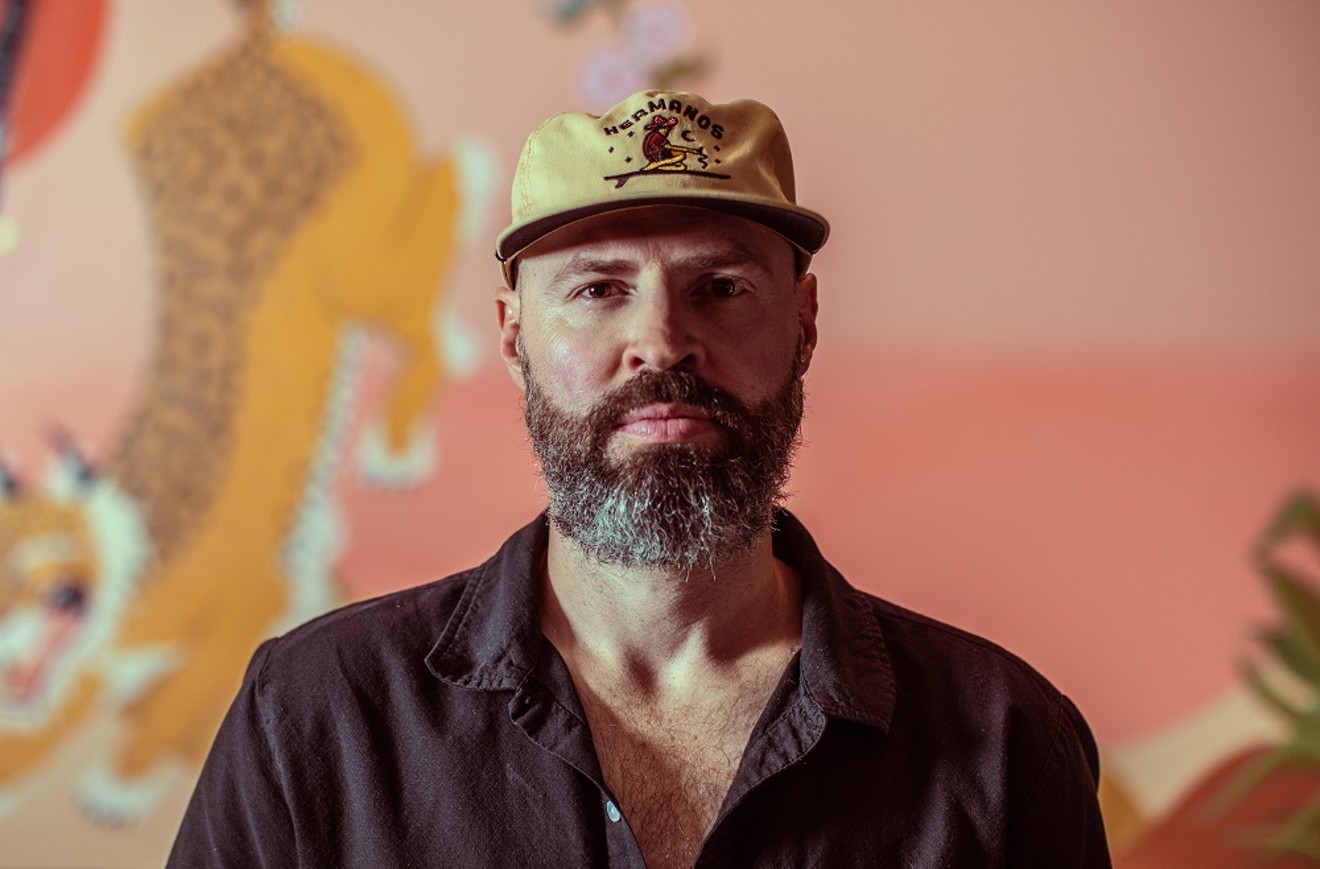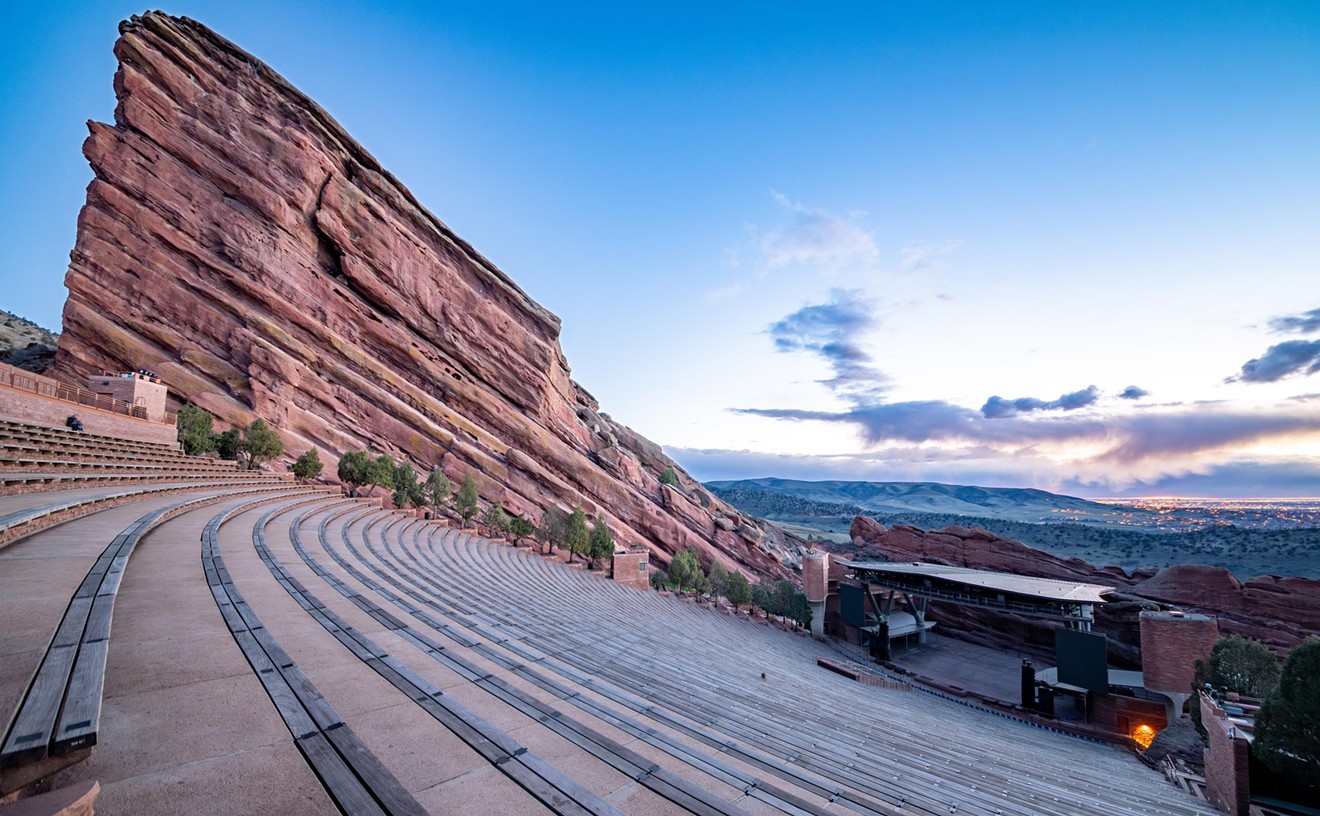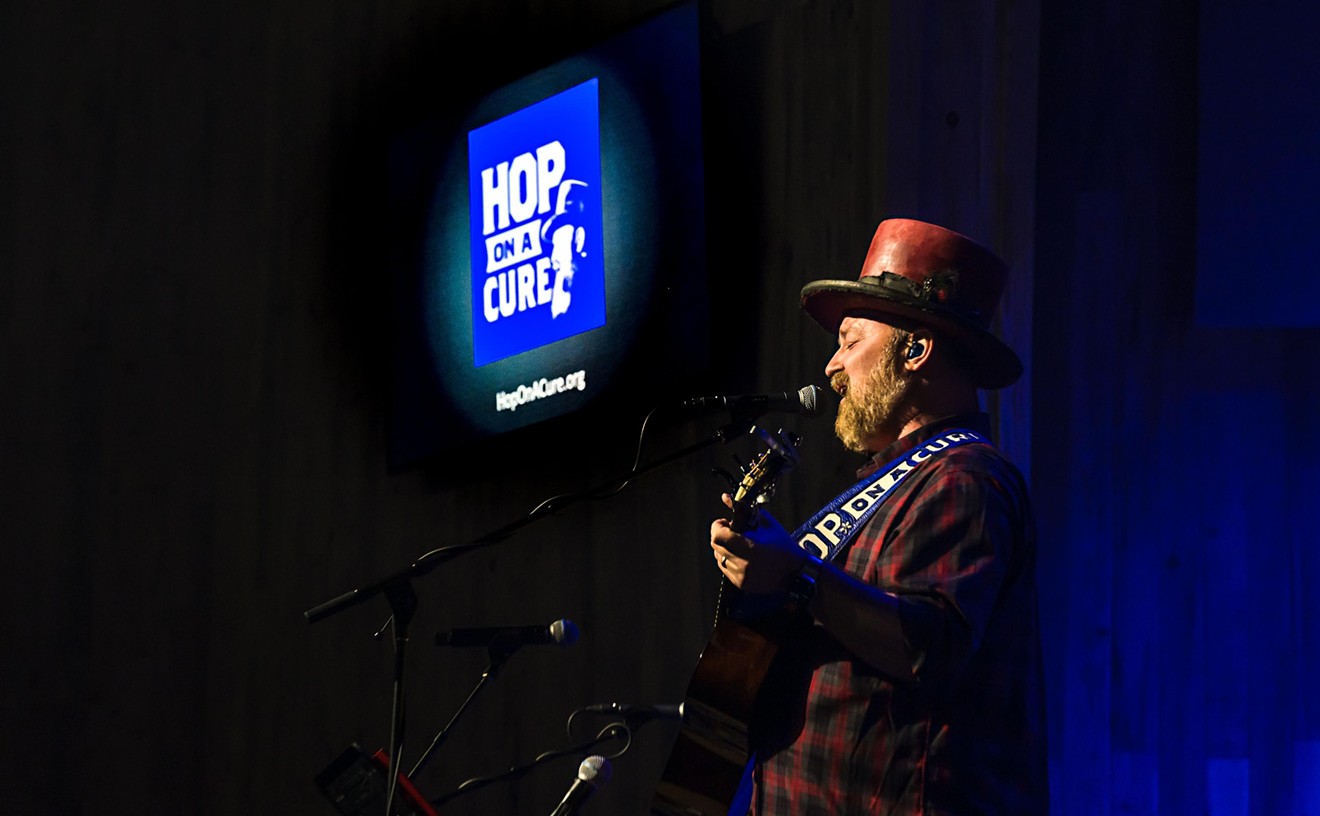Denver alt-country singer-songwriter Courtney Whitehead, who records and performs under the name Bison Bone, has long been a Baker neighborhood staple, but he’s an Okie at heart. Growing up in Oklahoma, the former jock even had quite the countrified nickname.
“Chicken gum,” Whitehead says, was his “baseball-superstitious” nickname as a teenager.
“Any championship game, any big game, my mom would always make fried chicken before the game. I'd always chew gum during the game; I would always I played third base, the hot corner, so there was a big game where I was playing really well and my coach was just, ‘He's chewing that chicken gum today,'" he explains. "It kind of stuck.”
Whitehead ended up in Denver about a decade ago because back then, at least, it was “super affordable” and the “killer music scene” went hand in hand with the gorgeous Colorado scenery and inspiring outdoor activities nearby.
“It wasn’t Nashville and it wasn’t Austin and it wasn’t L.A., and it felt like its own thing,” Whitehead says, “and it’s been real good to me.”
Denver’s population, businesses of all kinds and the music scene have exploded all around Whitehead during his time in the city, and he’s been keyed into it as a respected talent and music-community member, especially at his home base, the Skylark Lounge, the whole time.
Whitehead’s well-crafted songs and the sound of his records have evolved since the messy, dirty beauty of his country-rocker debut album, History of Falling (2017), which was heavily influenced by Drive-By Truckers. His new EP, 40 Grit, traverses grown-up topics in a series of songs that are similar to short films, and the heavenly engineering is stunning.
“It’s kind of more produced and warm,” Whitehead says. “I feel like the more you learn, the more tools you have to use. In this creative space, it kind of tends to go that way — a little more produced, a little more warm. I wanted everything done with a lot more intent on this. I wrote these songs so I could play them solo or with the full band, and I wanted them produced that way, but I also wanted it to be more about the songs and less guitar hooks. I wanted it to be very dynamic, a lot of textures and a lot more picturesque.”
Whitehead describes early Bison Bone tracks such as “22” (the lyrics include "I’ve got something for you / And it ain’t my goddamn .22") as “in your face,” whereas 40 Grit is “more sentimental and romantic in a sly way.”
“That’s maybe more where I am as a human,” he says. “I’m less angry, more trying to write my songs from a place of appreciation and gratitude, and less, like, going after somebody.”
“Blue Collar Hard,” one of the highlights on 40 Grit, is sentimental in a powerful, earnest way. It’s about Whitehead’s father.
“That’s his life,” Whitehead explains. “That’s him narrating the story, even with the title of it. I don’t work in the labor force anymore, you know. I think I only use my hands to cook and garden and play guitar, but he does auto-body repair, and he’s in his sixties, and he knows that world. [‘Blue Collar Hard’] was my way of really portraying these people that are human beings and aware, and maybe they don’t make the same decisions I do, but it’s not the way they may be portrayed in society now and the media. There’s plenty that I don’t agree with, but that was also my way of relating with a little bit of awareness.”
Whitehead, with his welcoming Oklahoma drawl, Western fashion and heartfelt performances, is “blue-collar hard” in his own way, but a close listen to his open-hearted yet gritty songs shows he’s grown something aligning more with Springsteen's blue-collar than Merle Haggard's. He’s disappointed with much of what’s called country music today, anyway.
“One thing I'm fairly angry or jaded about is these pop country or Nashville songwriters, where there's like four or five in a room, and none of them have lived in a small town,” Whitehead laments. “They don't have that experience, but they think that's what the hot thing is right now. [On 40 Grit], I was like, ‘Well, I'll show you how to write a song about being from a small town,’ because I know. Maybe you know that's never gonna make me a gold record, but it's also cathartic for me, which is the main reason why we do what we do.”
Whitehead’s beloved Baker neighborhood might be called a small town in itself, and the Skylark Lounge, for him, is its center. He’ll be returning to the Skylark with his full Bison Bone band on Friday, October 27 — a week after 40 Grit was released.
Oh, and that album title?
“It’s sandpaper,” Whitehead says. “40 grit is one of the toughest sandpapers there are, so it goes back to the blue-collar hard song, but there’s also a line in the last song on the EP, called ‘It’s All the Same,’ and it references, ‘Can we fix it with 40 grit?’ Essentially: Can we fix it with a shit-ton of hard work, or do we just give up? I thought that was a nice kind of over-arching theme for the record.”
Bison Bone plays the Skylark Lounge, 140 South Broadway, 8 p.m. Friday, October 27. Tickets are $12.
[
{
"name": "Air - MediumRectangle - Inline Content - Mobile Display Size",
"component": "12017618",
"insertPoint": "2",
"requiredCountToDisplay": "2",
"watchElement": ".fdn-content-body",
"astAdList": [
{
"adType": "rectangle",
"displayTargets": "mobile"
}
]
},{
"name": "Editor Picks",
"component": "17242653",
"insertPoint": "4",
"requiredCountToDisplay": "1",
"watchElement": ".fdn-content-body",
"astAdList": [
{
"adType": "rectangle",
"displayTargets": "desktop|tablet"
},{
"adType": "rectangle",
"displayTargets": "desktop|tablet|mobile"
}
]
},{
"name": "Inline Links",
"component": "18838239",
"insertPoint": "8th",
"startingPoint": 8,
"requiredCountToDisplay": "7",
"maxInsertions": 25
},{
"name": "Air - MediumRectangle - Combo - Inline Content",
"component": "17261320",
"insertPoint": "8th",
"startingPoint": 8,
"requiredCountToDisplay": "7",
"maxInsertions": 25,
"watchElement": ".fdn-content-body",
"astAdList": [
{
"adType": "rectangle",
"displayTargets": "desktop|tablet"
},{
"adType": "rectangle",
"displayTargets": "desktop|tablet|mobile"
}
]
},{
"name": "Inline Links",
"component": "18838239",
"insertPoint": "8th",
"startingPoint": 12,
"requiredCountToDisplay": "11",
"maxInsertions": 25
},{
"name": "Air - Leaderboard Tower - Combo - Inline Content",
"component": "17261321",
"insertPoint": "8th",
"startingPoint": 12,
"requiredCountToDisplay": "11",
"maxInsertions": 25,
"watchElement": ".fdn-content-body",
"astAdList": [
{
"adType": "leaderboardInlineContent",
"displayTargets": "desktop|tablet"
},{
"adType": "tower",
"displayTargets": "mobile"
}
]
}
]













